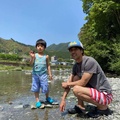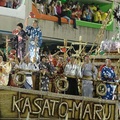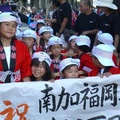I called my grandmother "Oba-chan." It is the Japanese word for "grandmother." She was born somewhere in California just before the First World War. Her parents arrived in America by a ship from Japan. My brother remembers her once showing a sepia-toned photo of a Japanese man wearing an American soldier's uniform of that time period. Was he drafted into the U.S. Army for the war? We'll never know the answer to that question because Oba-chan isn't around to answer it. And on top of that, we can't find that photo after cleaning out her house when she passed away.
Her family decided to go back to their home country when she was still an infant. She was raised on a farm in a place called Yanai in Yamaguchi Prefecture located in the southern part of Japan, close to Hiroshima. When a young man from Los Angeles was looking for a Japanese wife, his aunt who knew Oba-chan's family, felt that their daughter would make a good match, especially since she had American citizenship.
Because there were not many Japanese women in America, immigrant men resorted to arranged marriages with women from their home country. But in 1924, the Asian Exclusion Act prevented anymore Japanese from immigrating to the United States, effectively halting the flow of "picture brides." Since my grandmother had her papers, she was not affected by the Exclusion Act. My grandfather went to Japan, met Oba-chan for the first time, married and in 1936, brought his new bride back to Los Angeles.
Except for three years during World War II, Oba-chan lived in Los Angeles for the rest of her life. She never learned English and when I was a child, I never had a conversation with my grandmother. Even later in life, after learning conversational Japanese, I had a difficult time understanding her. She spoke a regional dialect using pre-World War II Japanese mixed in with English adopted by the immigrant community. She called a car "machine," and refered to my male friends as "boy-ya."
I find myself thinking of my grandmother and her life because lately I've been thinking about my identity as an American. The prevalent thought is one of assimilation. Be American, learn American ways, forget about the past. This is especially true for the Japanese American community because of what happened during World War II. The trauma of the injustice of the systematic relocation of persons of Japanese ancestry affected multiple generations down the line. On a subconscious level, Japanese Americans collectively shed their cultural identity in an effort to be accepted by mainstream America.
Everything about me is American. I was in the Boy Scouts. I know why the flag has 13 stripes. I play baseball and eat apple pie. I vote. I don't speak with an accent. In fact, I've been told many times by my fellow Americans that I speak English well. But I feel like something is missing. I know about the culture of America, but what about my own cultural identity? I know about the history of America, but what about my own family's history? What about the story of my Oba-chan? I've come to realize that assimilation doesn't make you accepted, it strips away a part of your true self, it robs you of your unique cultural identity, it forgets about the life of my grandmother.
The trigger for my introspection is not the election of President Obama as you might think. Rather, it’s been through my work as the Web Editor for Discover Nikkei. In my attempts to report on Japanese American culture it was clear to see that our culture is disappearing. Our greatest challenge is that our culture and traditions are not being passed on from generation to generation. Once again, I blame assimilation. I blame the war and the incarceration of the Issei and Nisei. But I also have to blame all of us for not taking action.
Go to Nisei Week Festival and bring all your family with you. Share your personal stories with your family. Re-learn the traditions you grew up with like taking the shoes off in the house and eating with ohashi. Support non-profit organizations that serve the community. Get in touch with your roots. Young ones, sit down with your elders and ask questions and keep asking until you get answers. Wise ones, open your mouths and tell us your stories, don’t stop talking until your voices are hoarse. And that’s just the beginning.
It is vital for our community to continue to pass along our cultural traditions because what makes America strong is not how alike we are, but the fact that we are all so different, but can co-exist together peacefully and with respect. Our diversity doesn’t divide us, but rather strengthens the fabric of this nation. We can’t afford to lose our cultural identity. The fact that this is a challenge for our community means that we are losing this battle. So act now, everyone. If we learned anything on the day Barack Hussein Obama became the 44th President of the United States, anything is possible in America.
© 2009 Bobby Okinaka





